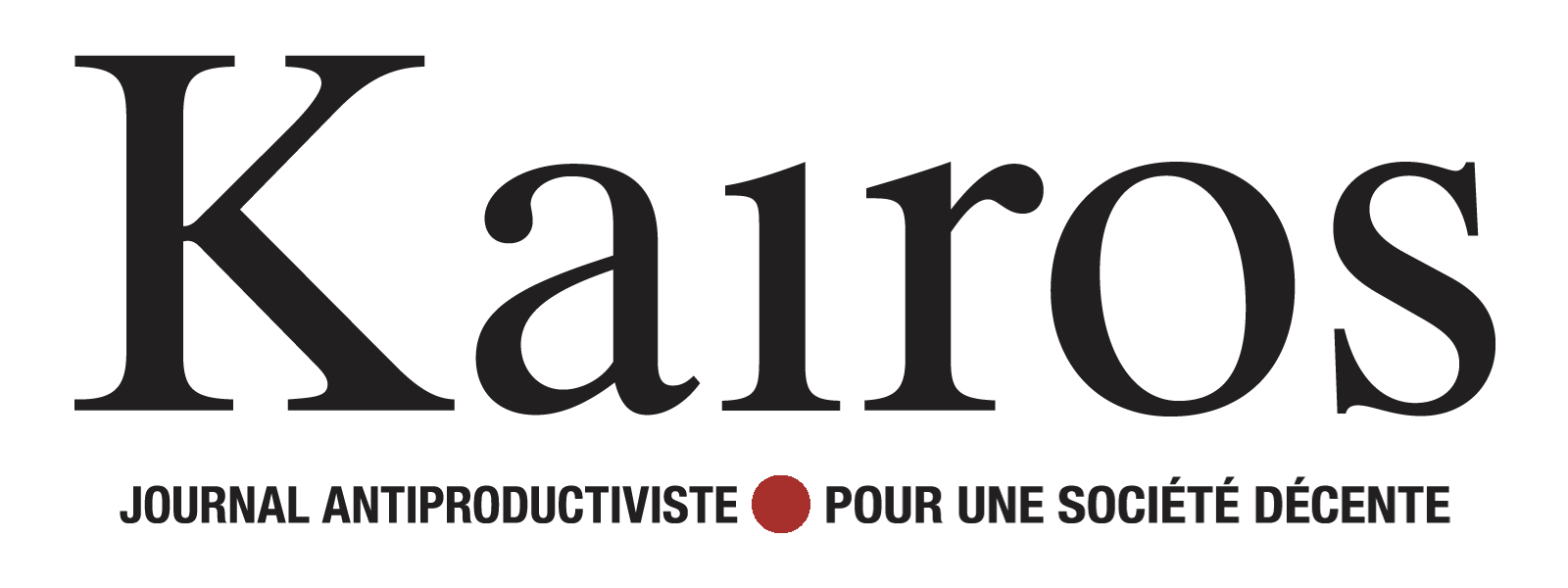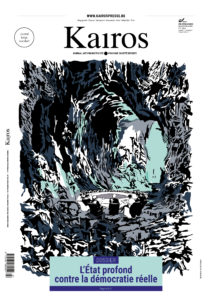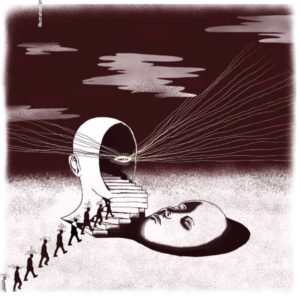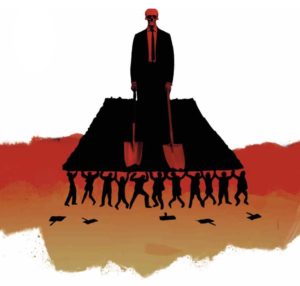Avec la dramatique et rapide avancée dans la mise en place du Nouvel Ordre Mondial, où la réélection du pantin Macron, Young Global Leader, poulain de Klaus Schwab, était déjà inscrite, nous avons pensé primordial de partager avec vous ce long article du Kairos 54, qui vient à peine de sortir. Ayant décortiqué son livre Covid-19: La grande Réinitialisation (ou Great Reset) pour en synthétiser les plus importantes idées et dessiné le projet global de l’auteur, ce résumé permettra à celui qui n’a ni l’envie ni le temps de lire l’ouvrage, indigeste, de se faire une idée de la feuille de route des hommes les plus puissants. Ce n’est pas juste une dystopie, c’est un programme, servilement mis en place par ceux que vous pensiez élire. Rappelez-vous toutefois que si vous pouvez lire cet article gratuitement, c’est parce que d’autres s’abonnent et nous soutiennent, permettant à la presse libre de continuer d’exister.
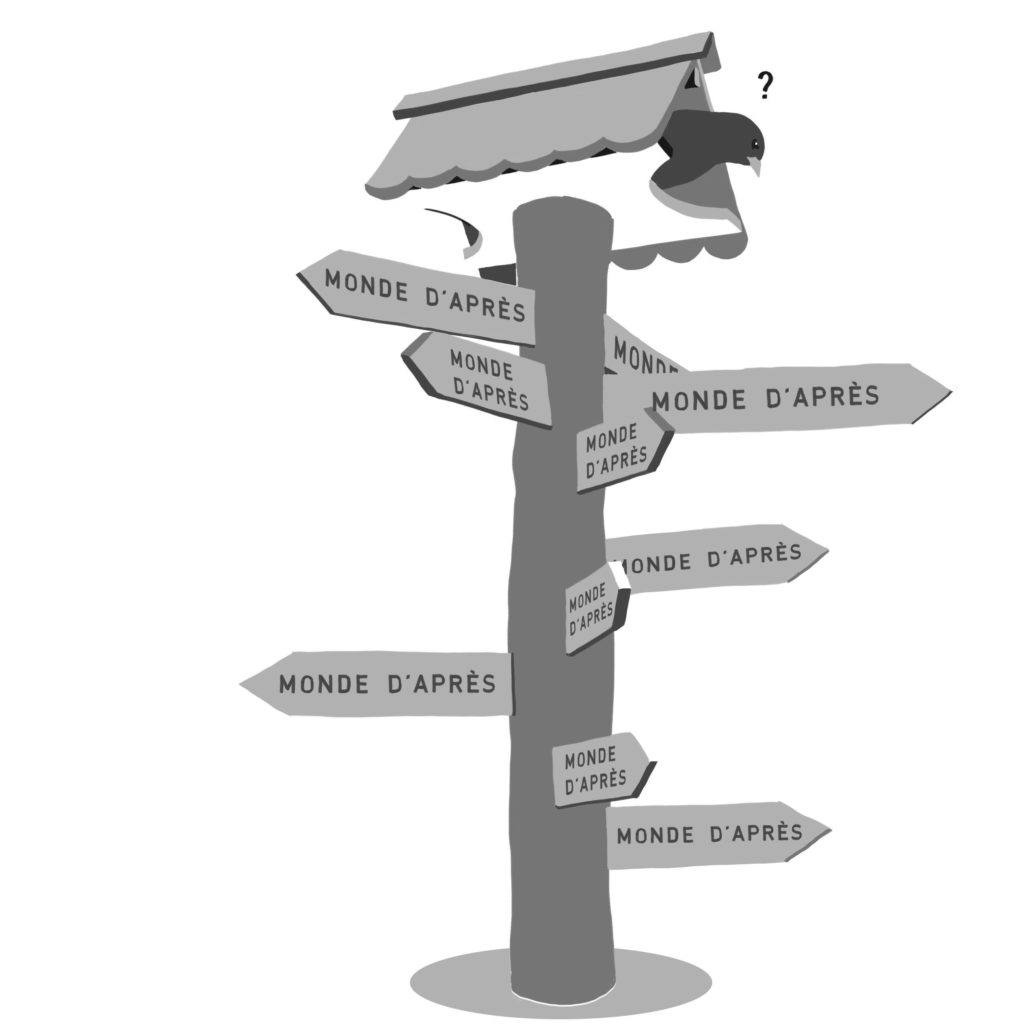
« L’ennemi contre lequel nous luttons est invisible ; notre famille, nos amis et nos voisins peuvent tous devenir des sources d’infection ; ces rituels quotidiens que nous chérissons, comme retrouver un ami dans un lieu public, peuvent devenir vecteurs de transmission ; et les autorités qui tentent de nous protéger en appliquant des mesures de confinement sont souvent perçues comme des représentants de l’oppression(1) ».
À sa lecture, on croit consulter Le Soir, Le Monde, TF1 ou encore La RTBF ; écouter une conférence de presse d’un gouvernement, un JT, suivre les nouvelles radiophoniques. Covid-19 : La grande réinitialisation (The Great Reset, TGR), est un modèle mental, un prêt-à-penser, un agenda, bible d’une idéologie avatar et apothéose finale(2) de celle qui a conquis nos sociétés depuis les années 1980. Qu’importe donc qu’il ait été écrit par Klaus Schwab et Thierry Malleret, ou un grand bureau de consultance, il témoigne d’une pensée unique qui irrigue tous les cercles de pouvoir et se donne comme objectif de conquérir les esprits.
« En ce début de juillet 2020, nous sommes à la croisée des chemins, avancent dans le préambule les auteurs de Covid-19 : la Grande réinitialisation. Une seule voie nous mènera vers un monde meilleur : plus inclusif, plus équitable et plus respectueux de Mère Nature. » Le lecteur attentif se posera avec raison la question : que veulent les auteurs en écrivant ce livre, est-ce une feuille de route, sorte de planning à venir, ou une réaction à chaud sur la situation présente, truffée d’hypothèses incertaines sur l’avenir ? Car l’ouvrage paraît osciller constamment entre la description et le souhait, l’explication et la volonté de voir advenir, l’enthousiasme et l’impuissance. Si les deux signataires le décrivent comme « principalement explicatif », fournissant des suppositions, il ressemble avant tout à un agenda d’intentions dont on est sûrs que les maîtres du monde mettront tout en œuvre pour les voir se réaliser, l’avouant d’ailleurs au détour d’une phrase : ce livre fournit « de nombreuses conjectures et idées sur ce à quoi le monde post-pandémique pourrait, et peutêtre devrait, ressembler ». Il serait en effet trop cynique de voir dans le cauchemar dystopique décrit dans TGR l’œuvre d’une volonté humaine prête à se déployer, et il reste préférable de le présenter derrière cette fausse incertitude d’un futur probable mais indéterminé. D’où l’utilisation récurrente de possibles opposés.
Dans cette schizophrénie maîtrisée, cette division troublante entre volonté assumée et impuissance feinte, s’écrit le désir d’agir rapidement dans un moment à saisir, « notre moment décisif », sorte de Kairos diabolique : « les possibilités de changement et le nouvel ordre qui en résultent sont désormais illimités et n’ont d’autre frein que notre imagination, pour le meilleur ou pour le pire ». On ne sait qui décidera du meilleur ou du pire : « Les sociétés pourraient être sur le point de devenir plus égalitaires ou plus autoritaires, ou orientées vers plus de solidarité ou plus d’individualisme », nous dit le patron du Forum économique mondial, forum qui réunit les plus grandes entreprises de destruction de la planète. Mais l’analyse de l’ensemble du texte dessine, nous le verrons, un pire probable, et souhaité, considérant que les conséquences négatives et souvent désastreuses de leurs choix seront inévitables.
Rappelons-nous que le livre est publié en juin 2020, trois mois à peine après le début du Covid et le premier confinement en Europe.
La pensée qui s’y déploie n’est donc pas la conséquence d’une expérimentation inédite, mais une situation unique dans laquelle va pouvoir se concrétiser une représentation du monde déjà pensée – et possédant les infrastructures utiles –, le prophète Schwab ayant déjà compris que le Covid-19 constitue un point de bascule : « Beaucoup d’entre nous se demandent quand les choses reviendront à la normale. Pour faire court, la réponse est : jamais » ; « Un monde nouveau va émerger, et il nous faut à la fois en imaginer et en dessiner les contours. »
Les auteurs établissent spécieusement un lien de causalité entre la pandémie et ses effets économiques et sociaux, comme si les seconds découlaient naturellement de la première, sans prendre en compte les mesures politiques qui les relient, comme si la main visible des gouvernements était celle de Dieu. Mesures qui auraient pu être tout autres, mais pour « faire émerger un nouveau monde », il ne fallait pas d’une épidémie gérable mais d’une catastrophe terrifiante(3), qui, comme il est explicitement énoncé, allait seulement profiter à une poignée qui avait les moyens de saisir l’opportunité : « Aux États-Unis, Amazon et Walmart ont recruté 250.000 personnes pour faire face à l’augmentation de la demande et ont construit une infrastructure massive pour fournir des services en ligne. Cette accélération de la croissance du e‑commerce signifie que les géants du commerce de détail en ligne sortiront probablement de la crise encore plus forts qu’ils ne l’ étaient avant la pandémie. »
Plein de certitudes sur l’issue de la « pandémie », TGR nous prévient que des « changements radicaux » formeront une « nouvelle normalité ». S’appuyant sur des exemples historiques, les auteurs montrent comment les quarantaines/confinements donnent et légitiment l’augmentation du pouvoir des gouvernements : « Du mot quaranta (qui signifie « quarante » en italien), l’idée d’enfermer les gens pendant 40 jours est née sans que les autorités ne comprennent vraiment ce qu’elles voulaient contenir, mais ces mesures ont été l’une des premières formes de « santé publique institutionnalisée » ayant contribué à légitimer « l’accumulation du pouvoir » par l’État moderne ». Voyageant entre l’accident propice et l’opportunité fortuite, on ne peut se défaire de l’impression qu’il n’y a pas contingence, mais événement. Qu’importe ici de savoir quelle est l’origine du Covid-19, ils en ont fait ce qu’ils voulaient en faire : la « peste » du XXIe siècle. « Peste » qui permettra de donner à l’État, indispensable structure pour organiser la « pandémie », des pouvoirs supérieurs. « Si des changements sociaux, politiques et économiques aussi profonds ont pu être provoqués par la peste dans le monde médiéval, la pandémie de Covid-19 pourrait-elle marquer le début d’un tournant similaire avec des conséquences durables et dramatiques pour notre monde actuel ? »
Aucun observateur n’aura remarqué « l’erreur » dans la citation qui précède, où, ceux qui écrivent, plutôt que de voir des changements qui ont été provoqués par la peste (forme passive), y voient une possibilité (« ont pu »), une situation opportune à exploiter. Cette analyse est confirmée par le fait qu’ils savent pertinemment que le Covid ne représente pas un danger pour l’humanité et que la dramatisation est de l’ordre du spectacle : « au niveau mondial, si l’on considère le pourcentage de la population mondiale touchée, la crise du coronavirus est (jusqu’à présent) l’une des pandémies les moins meurtrières que le monde ait connues au cours des 2.000 dernières années. Selon toute vraisemblance, à moins que la pandémie n’évolue de manière imprévue, les conséquences de la Covid-19 en termes de santé et de mortalité seront légères par rapport aux pandémies précédentes. Fin juin 2020 (alors que l’épidémie fait toujours rage en Amérique latine, en Asie du Sud et dans une grande partie des États-Unis), la Covid-19 a tué moins de 0,006% de la population mondiale. Pour replacer ce chiffre bas dans son contexte en termes de mortalité, la grippe espagnole a tué 2,7% de la population dumonde ».
Il fallait donc jouer sur l’équivoque, l’alimenter, ils ne savaient pas mais ont choisi la voix du pire : « Le degré élevé d’incertitude qui entoure actuellement la Covid-19 rend incroyablement difficile l’évaluation précise du risque qu’elle représente » ; « Depuis le début de la pandémie, nous avons été bombardés quotidiennement par un flux incessant de données mais, en juin 2020, soit environ six mois après le début de l’épidémie, nos connaissances sont encore très incomplètes et, par conséquent, nous ne savons pas encore vraiment à quel point la Covid-19 est dangereuse. » Plutôt que de relativiser la maladie, ils ont mis en place tous les ingrédients pour la rendre terrible. De fait, « les « mesures sanitaires » imposées depuis 18 mois sont radicalement contraires à ce que l’on savait devoir mettre en œuvre pour gérer efficacement une épidémie ». Ils n’auraient jamais dû perturber le fonctionnement social normal et auraient dû mettre en place une politique de santé publique forte(4).
PANDÉMIE ET NOUVEL ORDRE MONDIAL
« Les réponses d’urgence économique à la pandémie étant désormais en place, il est possible de saisir l’occasion de procéder au type de changements institutionnels et de choix politiques qui placeront les économies sur une nouvelle voie »(5).
Seule une pandémie pouvait assurer la gestion globale de tous les pays comme une seule et même grande entreprise et permettre la mise en place du gouvernement mondial propre au Nouvel Ordre : « Les 7 milliards de personnes qui vivent sur notre planète ne vivent plus dans une centaine de bateaux distincts [pays] ; elles vivent dans 193 cabines à bord du même bateau. » Klaus Schwab citant Kishore Mahbubani, un universitaire et ancien diplomate de Singapour. Selon ses propres termes, il s’agit de l’une des plus grandes transformations jamais réalisées. En 2020, il a approfondi cette métaphore dans le contexte de la pandémie en écrivant : « Si nous sommes aujourd’hui 7,5 milliards de personnes les unes sur les autres sur un bateau de croisière infecté par le virus, est-il logique de nettoyer et de récurer uniquement nos cabines personnelles tout en ignorant les couloirs et les conduites d’aération extérieures, par lesquels le virus voyage ? La réponse est clairement non. Pourtant, c’est ce que nous avons fait… Puisque nous sommes maintenant dans le même bateau, l’humanité doit prendre soin du bateau mondial dans son ensemble. »
Dans Covid-19 : La grande réinitialisation, ils feignent de s’étonner des horreurs que ce monde a créées, comme s’il avait fallu le Covid pour les révéler : « Le premier effet de la pandémie a été d’amplifier l’enjeu gargantuesque de l’injustice sociale en mettant en lumière les disparités choquantes entre les degrés de risque auxquels sont exposées les différentes classes sociales. » Alors que ce sont les politiques que le FEM préconise qui ont fait ce monde : « Dans un revirement surprenant et soudain, l’idée, qui aurait été un anathème il y a encore quelques années, selon laquelle les gouvernements peuvent promouvoir le bien public tandis que des économies à la dérive, sans supervision peuvent faire des ravages sur le bien-être social, pourrait maintenant devenir la norme. Sur le cadran qui mesure le continuum entre le gouvernement et les marchés, l’aiguille s’est sans aucun doute déplacée vers la gauche. » Nous avons désormais atteint l’ère de symbiose parfaite entre le capitalisme et le communisme. Les structures gouvernementales ont été les courroies de transmission permettant la mise en place d’un Nouvel ordre mondial, elles leur étaient indispensables : « Seuls les gouvernements avaient le pouvoir, la capacité et la portée nécessaires pour prendre de telles décisions, sans lesquelles une calamité économique et un effondrement social complet auraient prévalu. » Le 21 mars 2022, le Think Tank Business Roundtable (Apple, Visa, General Motors, JPMorgan, Walmart, United Airlines, Paypal, American Express, Alphabet, Amazon, Blackrock, BP, Boston Consulting Group…), recevait Joe Biden, limpide sur ses objectifs : « C’est maintenant que les choses changent. Il va y avoir un nouvel ordre mondial et nous devons le diriger. Et nous devons unir le reste du monde libre pour le faire. »
On pouvait croire qu’ils allaient s’attaquer aux paradis fiscaux et à la criminalité financière… Nullement. La politique Covid-19 a enrichi comme jamais les plus grandes multinationales, favorisé les banquiers, approfondi les inégalités et la misère. Alors que la mondialisation de l’ère pré-covid était responsable de millions de morts et du creusement des inégalités, TGR nous récite la fable du « c’était bien avant, ce sera encore mieux après », hors des « ravages » qu’il évoque : « La mondialisation (…) a sorti des centaines de millions de personnes de la pauvreté ».
COVID ET CLIMAT
Objet d’une simulation quelques mois avant sa mise en place dans le réel (Z event 2021(6)), l’événement Covid-19 était aussi l’élément parfait pour concentrer l’ensemble des « luttes » et assurer la pérennité de la soumission des masses : « La Covid-19 nous a rappelé que les plus grands problèmes auxquels nous sommes confrontés sont de nature mondiale. Qu’il s’agisse de pandémies, de changement climatique, de terrorisme ou de commerce international, ce sont tous des problèmes mondiaux que nous ne pouvons aborder, et dont les risques ne peuvent être atténués, que de manière collective. » (…) « À première vue, la pandémie et l’environnement pourraient passer pour des cousins éloignés ; mais ils sont bien plus proches et imbriqués que nous le pensons »… ce qui permet de comprendre pourquoi dès le début les institutions européennes ont parlé de Green Pass ; on passera du Covid au climat par « contagion comportementale », même si ce ne sont là que des postures, du business as usual, une « opportunité considérable » maquillée en « nécessité impérieuse ». Le Nouvel Ordre Mondial se fera avec l’OMS en tête de gondole, « la seule organisation capable de coordonner une réponse mondiale à la pandémie », comme le dit Bill Gates, cité dans l’ouvrage : « Leur travail ralentit la propagation de la Covid-19 et si ce travail est arrêté, aucune autre organisation ne pourra les remplacer. Le monde a plus que jamais besoin de @WHO. » En somme, l’échec, pris en exemple, ainsi qu’une incapacité stratégique, serviront à justifier la fin complète de ce qu’il demeurait de souveraineté nationale. Ils ont d’ailleurs prévu de « sacrifier » politiquement les responsables politiques de l’ère Covid, ce qui justifiera le transfert de pouvoir vers des acteurs supranationaux comme l’OMS, et ils espèrent que le peuple le demande : « C’est précisément cet échec de la gouvernance mondiale que nous dépeint la Covid-19. » Et les auteurs de conditionner le « redémarrage (7) » à cette coopération internationale.
L’heure de l’hyperconnectivité aura permis le scénario Covid-19 : « Plus de la moitié (52 %) de la population mondiale est aujourd’hui connectée, contre moins de 8 % il y a 20 ans ; en 2019, plus de 1,5 milliard de smartphones – symbole et vecteur de vitesse qui nous permet d’être joignables partout et à tout moment ont été vendus dans le monde. L’Internet des objets (IoT) relie aujourd’hui 22 milliards d’appareils en temps réel, allant des voitures aux lits d’hôpitaux, des réseaux électriques aux pompes des stations d’eau, en passant par les fours de cuisine et les systèmes d’irrigation agricole. Ce nombre devrait atteindre 50 milliards ou plus en 2030. » Les auteurs poussent la comparaison de la rapidité de déploiement de ces avancées technologiques avec celle du Covid, comme si celui-ci était aussi un produit du système : « Rien n’illustre de façon aussi frappante cette situation que la vitesse fulgurante à laquelle la Covid-19 a progressé en mars 2020. En moins d’un mois, suite au maelström provoqué par la vitesse vertigineuse à laquelle la pandémie a englouti la plus grande partie du monde, il semble qu’une toute nouvelle ère ait commencé à se dessiner. » La perfidie est poussée au point de montrer ses cartes, sans vergogne : « les choses ont tendance à changer progressivement au début, puis d’un seul coup. Attendez-vous à la même chose pour la réinitialisation « macro ». » Prévenus à temps, les cobayes de cette ingénierie sociale planétaire auraient certainement refusé le menu du monde qu’on leur présentait, mais la progressivité propre à la manipulation des masses a tétanisé les foules, prêtes à suivre leur bourreau-sauveur.
L’écriture de cet ouvrage trois mois à peine après le début de la pandémie, d’une clarté étonnante, démontre que l’événement Covid-19 s’intègre à un système, prend corps et l’accompagne. Il fait plus qu’esquisser la nécessité que les gens obéissent à de nouvelles règles et comportements, et indique l’essentiel qu’est la mise en place d’une toile d’araignée mondiale de contrôle, capable d’assurer l’obéissance indispensable à la poursuite du projet, maquillée sous des prétextes sanitaires. « Une pandémie est un système adaptatif complexe fait de nombreuses composantes ou informations différentes (…) Pour cette raison, elle peut et doit être considérée comme un « réseau vivant » qui s’adapte aux conditions changeantes (…) La gestion (le confinement, dans ce cas particulier) d’un système adaptatif complexe exige une collaboration continue en temps réel (…) Pour donner un exemple général et trop simplifié, l’endiguement de la pandémie de coronavirus nécessitera un réseau de surveillance mondial capable d’identifier les nouveaux foyers dès leur apparition (…) Elle accentuera également l’un des plus grands défis sociétaux et individuels concernés par la technologie : la vie privée. Nous verrons comment le traçage de contacts a une capacité inégalée et une place quasi essentielle dans l’arsenal nécessaire pour combattre la Covid-19, tout en étant capable de devenir un outil de surveillance de masse. » (…) « La pandémie pourrait ouvrir une ère de surveillance sanitaire active rendue possible par les smartphones à détection de localisation, les caméras de reconnaissance faciale et d’autres technologies qui identifient les sources d’infection et suivent la propagation d’une maladie en temps quasi réel. »
Ils savaient déjà avant le Covid qu’une crise économique sans précédent se profilait : « La catastrophe économique mondiale à laquelle nous sommes confrontés aujourd’hui est la plus grave enregistrée depuis 1945 ; en termes de vitesse pure, elle est sans précédent dans l’histoire. Bien qu’elle ne soit pas à la hauteur des calamités et du désespoir économique absolu que les sociétés ont connus dans le passé, elle présente des caractéristiques significatives d’une similarité troublante ». Cette « similarité troublante », bien que Covid-19 soit « l’épidémie la moins meurtrière de l’histoire », a permis de mettre en place une forme de démission contrôlée : « L’histoire montre que les épidémies ont été à l’origine des grandes réinitialisations de l’économie et du tissu social des pays. Pourquoi en serait-il autrement avec la Covid-19 ? », et « d’accompagner » l’effondrement économique : « La Covid-19 a provoqué une crise de l’offre et de la demande qui a conduit à la plus forte chute de l’économie mondiale enregistrée en plus de 100 ans. Comme l’a prévenu l’économiste Kenneth Rogoff en parlant de la pandémie : « Tout dépend du temps que cela prendra, mais si elle dure longtemps, ce sera certainement la mère de toutes les crises financières ». » On allait donc pouvoir par un tour de prestidigitation faire croire que Covid-19 était à l’origine de la crise financière.
Il fallait organiser l’ignorance, que nous n’apprenions rien et que les questions se multiplient, laissant ceux qui voulaient dire autre chose et nous rassurer dans l’impossibilité de le faire. Le poulain de Bill Gates, Peter Piot, cité dans l’ouvrage comme « l’un des plus grands virologues du monde », ne dira rien d’autre : « Plus nous en apprenons sur le coronavirus, plus les questions se multiplient. »
Dès le début, malgré toutes leurs «incertitudes», les « décideurs » ne doutèrent pas un seul instant sur l’unique remède à apporter au mal : « Le prochain obstacle est le défi politique consistant à vacciner suffisamment de personnes dans le monde (collectivement, nous sommes aussi forts que le maillon le plus faible) avec un taux de conformité suffisamment élevé malgré la montée des anti-vaccins. »
CE QUE LE COVID PERMET…
« La plupart des gens, craignant le danger que représente la Covid-19, se poseront la question : N’est-il pas insensé de ne pas exploiter la puissance de la technologie comme moyen de nous aider alors que nous sommes victimes d’une épidémie et confrontés à une question de vie ou de mort? Ils seront alors prêts à renoncer à une grande partie de leur vie privée et conviendront que, dans de telles circonstances, la puissance publique peut légitimement passer outre les droits individuels »
« Avec la pandémie, la “ transformation numérique ” à laquelle tant d’analystes font référence depuis des années, sans savoir exactement ce qu’elle signifie, a trouvé son catalyseur »
Conséquences inévitables ou heureuses aubaines, il est difficile d’établir la distinction lorsque nos deux auteurs décrivent les effets post-Covid. Il est évident qu’ils savent qu’il faudra passer par une « destruction créatrice » pour mener à bien la grande transition (ou Great Reset). Car les deux se conjuguent subséquemment : quand on détruit, on érige le nouveau. Du chaos maîtrisé, de la poussière, se construit leur meilleur des mondes.
La thérapie de choc du Covid-19 aura en effet permis de mettre en place ou d’accélérer d’opportuns « investissements stratégiques » et « d’emprunter le TGV numérique »(8) tant attendu : « En l’espace d’un mois seulement, il est apparu que de nombreuses entreprises ont fait un bond de plusieurs années en avant en termes d’adoption de technologies. Cette avancée fut bien accueillie par les adeptes du numérique, mais beaucoup moins par les autres (parfois de façon catastrophique). Satya Nadella, directeur général de Microsoft, a observé que les exigences de distanciation sociale et physique ont créé un monde du “ tout à distance ”, avançant de deux ans l’adoption d’un large éventail de technologies, tandis que Sundar Pichai, PDG de Google, s’est émerveillé du bond impressionnant de l’activité numérique, prévoyant un effet “ significatif et durable ” sur des secteurs aussi différents que le travail, l’éducation, le shopping, la médecine et les loisirs en ligne. »
Alors que le confinement et la « distanciation sociale » favorisaient la numérisation et les relations virtuelles, les multinationales pharmaceutiques s’affairaient à préparer un produit faussement appelé « vaccin » dans la plus grande précipitation, avec une Europe qui les exempta préalablement des responsabilités par rapport aux risques inhérents à un tel empressement. Sachant que ce qu’ils détruiraient ne reviendrait pas, ils ont conditionné, dans un fabuleux mensonge, la reprise économique et le retour « à la vie d’avant », en un chantage à la piqûre: « Dans les mois à venir, la situation du chômage est vouée à se détériorer davantage, pour la simple raison qu’elle ne peut pas s’améliorer de manière significative tant qu’une reprise économique durable n’est pas amorcée. Cela n’arrivera pas avant qu’un vaccin ou un traitement soit trouvé ».
Leur société du robot était déjà dans les bacs, mais, et ils le savent, ce que le robot remplace, l’homme le perd, en toute logique : « Selon toute vraisemblance, la récession induite par la pandémie va déclencher une forte augmentation du remplacement de la main-d’œuvre, ce qui signifie que le travail physique sera remplacé par des robots et des machines “ intelligentes ”, ce qui à son tour provoquera des changements durables et structurels sur le marché du travail. »(9) L’automatisation, accélérée par le Covid, permettra de faire gagner du temps aux travailleurs, à court terme et de les virer à moyen terme : « Les solutions RPA (l’automatisation robotisée des processus) ont aidé certains hôpitaux à diffuser les résultats des tests Covid-19, permettant aux infirmières d’économiser jusqu’à trois heures de travail par jour », « au détriment d’une augmentation probable du chômage »… Le confinement et la peur leur feront demander ce qu’ils n’auraient jamais voulu d’euxmêmes et que la catastrophe accentuera : « Les consommateurs pourraient préférer les services automatisés aux interactions en face à face pendant encore un certain temps, ce qui se passe actuellement avec les centres d’appel se produira donc inévitablement dans d’autres secteurs. « L’angoisse de l’automatisation » est donc promise à un renouveau, que la récession économique va aggraver. » États et individus auront creusé leur propre tombe.
La recette du monde de demain de Klaus Schwab est faite d’intelligence artificielle, biologie synthétique, automatisation, robots; de biotechnologie, télémédecine, livraison par drone, réunion virtuelle, école numérique, économie sans contact(10), sports électroniques. (169). La fin de ce qui fait de nous des humains, êtres sensibles et grégaires : « se rendre en voiture à une réunion de famille loin de chez soi pour le week-end (le groupe familial WhatsApp n’est pas aussi amusant mais, là encore, plus sûr, moins cher et plus écologique) ou même assister à un cours universitaire (pas aussi satisfaisant, mais moins cher et plus pratique). » ; « La tendance semble claire : le monde de l’enseignement, à l’instar d’autres industries, deviendra en partie virtuel. » (…) « La pandémie pourrait se révéler être une aubaine pour l’enseignement en ligne. »
Recette que la pandémie aura « suralimenté » : « la pandémie accélérera encore plus l’innovation, en catalysant les changements technologiques déjà en cours (comparables à l’effet d’amplification qu’elle a eu sur d’autres problèmes mondiaux et nationaux sousjacents) et en « suralimentant » toute entreprise numérique ou la dimension numérique de toute entreprise. »
Le massacre de la classe moyenne s’accompagnera de celui de ceux qui étaient déjà victimes de ce monde depuis des siècles, à savoir les classes populaires et les pays aujourd’hui dénommés « émergents » et « pauvres surendettés », ces derniers encaissant le plus : « Pour eux, cette crise va prendre des proportions énormes et il leur faudra des années pour en sortir, avec des dommages économiques considérables se traduisant rapidement par une douleur sociale et humanitaire. » (…) « Elle pourrait entraîner une catastrophe humanitaire et une crise alimentaire » (…) « D’une manière ou d’une autre, ces risques auront pour conséquences une plus grande instabilité, voire le chaos. » (…) « Dans les années à venir, alors que la pandémie infligera des souffrances à l’échelle mondiale, il est fort probable que la dynamique n’ira que dans un sens pour les pays les plus pauvres et les plus fragiles du monde : de mal en pis. En bref, de nombreux États qui présentent des facteurs de fragilité risquent d’échouer. »
Ces bouleversements s’accompagneront de troubles sociaux, le Forum de Davos les ayant déjà prévus : « Le bouleversement sociétal déclenché par la Covid-19 durera des années, voire des générations. L’impact le plus immédiat et le plus visible est que de nombreux gouvernements seront pris à partie, avec beaucoup de colère dirigée contre les décideurs politiques et les personnalités politiques, dont les réponses à la gestion de la Covid-19 ont semblé inappropriées ou mal préparées. » Ils n’ont pas peur de la révolte, ils l’ont déjà anticipée… elle leur permettra de refourguer leur Nouvel ordre. « L’un des dangers les plus profonds de l’ère post-pandémique est l’agitation sociale. Dans certains cas extrêmes, elle pourrait conduire à la désintégration de la société et à l’effondrement politique. D’innombrables études, articles et avertissements ont mis en lumière ce risque particulier, en se fondant sur le constat évident que lorsque les gens n’ont ni emploi, ni revenu ni perspective de vie meilleure, ils ont souvent recours à la violence. » Les auteurs auraient même cette cynique lucidité : « Les inégalités pourraient donc diminuer mais, si l’on se fie à l’histoire, ce scénario optimiste a peu de chances de l’emporter s’il n’est pas précédé de troubles sociaux conséquents. »
Marche ou crève : « Ceux qui ont pris du retard et ont raté le train numérique à grande vitesse auront beaucoup de mal à s’adapter et à survivre » (…) « La réinitialisation “ micro ” obligera chaque entreprise de chaque secteur à expérimenter de nouvelles façons de faire des affaires, de travailler et de fonctionner. Ceux qui essaieront de revenir à l’ancienne façon de faire échoueront. Ceux qui s’adaptent avec agilité et imagination finiront par tourner la crise de Covid-19 à leur avantage. » C’est le cycle infernal de la peur qui nourrit le changement qui nourrit la peur : « Sous une forme ou une autre, les mesures de distanciation sociale et physique risquent de persister après la fin de la pandémie elle-même, ce qui justifie la décision de nombreuses entreprises issues de différentes industries d’accélérer l’automatisation. Au bout d’un certain temps, les préoccupations persistantes au sujet du chômage technologique s’estomperont à mesure que les sociétés mettront l’accent sur la nécessité de restructurer le lieu de travail de manière à réduire au minimum les contacts humains rapprochés. » En un tournemain, ils auront réussi à générer la fausse solution (« distanciation sociale ») à un problème mineur (coronavirus) qu’ils ont présenté comme gravissime, générant la peur et favorisant de nouvelles « solutions » (automatisation) pour s’adapter au monde sans contacts qu’ils ont mis sur pied : « Les technologies d’automatisation sont particulièrement bien adaptées à un monde dans lequel les êtres humains ne peuvent pas être trop près les uns des autres ou sont prêts à réduire leurs interactions. Notre crainte persistante et peut-être durable d’être infecté par un virus (celui de la Covid-19 ou autre) va donc accélérer la marche implacable de l’automatisation, en particulier dans les domaines les plus sensibles à celle-ci. En 2016, deux universitaires d’Oxford sont arrivés à la conclusion que jusqu’à 86% des emplois dans les restaurants, 75% des emplois dans le commerce de détail et 59% des emplois dans le secteur du divertissement pourraient être automatisés d’ici 2035. Ces trois industries sont parmi les plus durement touchées par la pandémie et c’est dans celles-ci que l’automatisation, pour des raisons d’hygiène et de propreté, sera une nécessité qui, à son tour, accélérera encore la transition vers plus de technologie et plus de numérique ».
Covid-19, c’est la prophétie auto-réalisée, l’opportune « pandémie », plateau d’argent pour nous amener à accélérer l’émergence d’un monde techno-totalitaire où ceux qui gagnaient déjà se surpasseront en écrasant les autres. « Ce n’est pas par hasard que des entreprises comme Alibaba, Amazon, Netflix ou Zoom sont sorties « gagnantes » de ces confinements » (…) « Il est tout à fait naturel qu’ils soient les principaux bénéficiaires de la pandémie ». Non, ce n’est pas un hasard Herr Schwab. C’est « naturel ». Comme « ces petites entreprises [qui] vont excessivement souffrir de cette situation, car elles devront lutter pour survivre aux fermetures imposées par le confinement (ou à la forte réduction des activités) et éviter la faillite. Si elles sont obligées de fonctionner à capacité réduite avec des marges encore plus étroites, beaucoup ne survivront pas. » (…) « Prenez les restaurants. Ce secteur d’activité a été frappé par la pandémie à un point tel que l’on ne sait même pas comment le secteur de la restauration pourra se rétablir un jour. » (…) « En France et au Royaume-Uni, plusieurs voix de l’industrie estiment que jusqu’à 75 % des restaurants indépendants pourraient ne pas survivre au confinement et aux mesures de distanciation sociale consécutives. » Ne pensez donc pas que votre soumission sera récompensée, elle ne fera que précipiter votre perte.
« Si vous désirez une image de l’avenir, imaginez une botte, piétinant un visage humain… éternellement » (George Orwell).
Alexandre Penasse
- Toutes les citations reprises dans ce texte, sauf mention contraire, sont tirées du livre de Klaus Schwab et Thierry Malleret, Covid-19 : La grande réinitialisation.
- https://www.ln24.be/2022–03-25/pour-le-patron-de-blackrock-lamondialisation-cest-mort
- https://www.kairospresse.be/dune-epidemie-gerable-a-une-catastropheterrifiante/
- Voir https://www.kairospresse.be/dune-epidemie-gerable-a-une-catastropheterrifiante/
- L’auteur ajoute « plus juste et plus vert », mais ce n’est, nous le verrons, que de l’enfumage.
- https://www.centerforhealthsecurity.org/event201/about
- Le verbe est entouré de guillemets, cf p.96.
- https://www.kairospresse.be/nouvelles-technologies-et-transition-numeriquelillusion-technocratique-la-lumiere-de-la-5g/?
- https://www.lesoir.be/390333/article/2021–08-20/elon-musk-devoile-le-teslabot-un-robot-humanoide-video
- Cf. p.128, note de bas de page.
